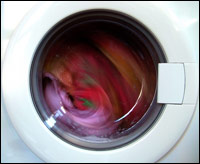Dear Umbra,
I’ve done the research, and I’m ready to buy my first front-loading washing machine. And then a pesky friend starts asking the tough questions. “Does your existing machine work?” Yes. “Are you going to sell it to someone else who will keep using it?” Yes. “So, two machines where there used to be one … how is that better for the environment?” Can you help me answer this one? I’m facing the same issue on the transportation front, as I just convinced my spouse that he should sell his 2002 Subaru and buy a Toyota Prius.
Kathleen Whitson
Seattle, Wash.
Dearest Kathleen,
First off, appliances are not kidneys. There is no epic waiting list for used ones, because they are plentiful, and enter the market every day. When you sell yours, no hosannas will sound from on high. Either a household has the budget to own a washer, or it does not. And either there is money to buy a new, efficient washer, or there is not. We do not prevent appliance ownership through hoarding.

Hoarding won’t help.
Photo: Jim Orr/iStockphoto.
Your friend believes s/he is looking beyond your personal gain to the impact on society as a whole. Let us imagine the Whitson family washer and the washer of another family — obviously the Joneses — who are looking for a better, pre-owned machine. That’s two households with two older, inefficient machines. When you get a new, efficient machine and the Joneses upgrade to your old one, then the two households are in toto more efficient. If we follow your friend’s logic, s/he believes the first scenario — the two old machines — is better for society than the second. I do not.
What will the Joneses do with their old machine? Either send it to the scrap-metal heap (that’s the third R, recycle) or sell it to the next people down the budgetary ladder (reuse!). Speaking of that ladder: there is an appliance trickle-down effect. You will eventually tire of your efficient machine, and it will enter the used-goods market. If no one bought efficient machines, they would never trickle down to those of us who can only afford pre-owned goods. In a personal example, I eagerly await the day my mother tires of her new Prius and deigns to pass it along to me. There is no way I will ever buy a new Prius or any other hybrid; I can only hope for the dregs.
Let’s affirm our victory over pesky friends and wrap up with all the positive aspects of buying a new, efficient washer: lower water and water-heater use; less generated sewage; consumer support of energy-efficient technologies; cleaner, longer-lasting garments; inspiring similar behaviors in others; and last and least, affecting the durable-goods index. Your personal energy impact will be improved in every way. The only possible downside is showing “consumer confidence” during the Bush administration. But as I’ve said before, efficient appliances are the right move.
Now that we have that out of the way, I have to tell my story about the Seattle dump. It’s related, because I was paying for some yard waste at the exit and (thinking always of you, dearest readers) asked the agent what happens to collected appliances. He spoke for a few minutes about how they charge a flat fee for all appliances, how those without refrigerants are sold for scrap metal, and how that subsidizes the disposal of refrigerants from other machines. Then, without pausing at all, he said, “But the most important thing is to treat yourself real well, and don’t accept anything less than love and appreciation.” I will leave you with that thought.
Lovingly,
Umbra


